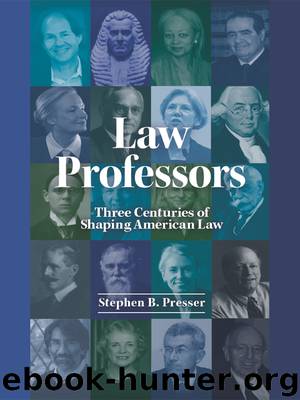Law Professors by Stephen Presser

Author:Stephen Presser
Language: eng
Format: epub
ISBN: 9781683281535
Publisher: West Academic
Published: 2016-03-16T04:00:00+00:00
243
CHAPTER 12
JUSTIFYING THE WARREN COURT
MID AND LATE TWENTIETH CENTURY, EARLY TWENTY-FIRST CENTURY
Ronald Dworkin
(NYU and Oxford)
Ronald Dworkin (1931–2013)
Taken at the Brooklyn Book Festival (2008) by David Shankbone. Wikimedia Commons.
Ronald Dworkin’s achievement was to defend the Warren Court through an appeal to something very much like “natural law.” He was also notable as one of the few American law professors simultaneously to hold an appointment at a great English University, thus becoming something of an American Lewis Eliot.746 Dworkin’s 244
English appointment was at Oxford,747 and just as Blackstone trained a generation of English aristocrats at that university to implement Blackstone’s notions of the English common law,748 so it might be said that Dworkin’s thought influenced a generation of English and American law students, law professors, and even judges, but in Dworkin’s case, it was to implement a quite different style of legal exegesis. Blackstone believed that the judges’ job was to follow the rules previously laid down, and, in a way, Dworkin conceived of the judicial task as similarly one of applying pre-existing law, although for Dworkin this pre-existing law consisted of over-arching principles inherent in the system of rules, and not necessarily any precise previously-articulated dictates. These principles, which, presumably, every sensible person would agree are inherent in the system of legal rules, include statements such as “no man may profit by his own wrong,”749 or “everyone has the right to be treated with equal dignity and respect,” and, as one commentator on Dworkin put it, “The origin of these principles lies not in the practical decision of some legislature or court but in a sense of appropriateness—often a sense of the moral appropriateness—developed in the legal profession and in the public during a considerable period of time.”750
While Dworkin, who posited these purportedly clear pre-existing broad principles, could plausibly argue that his notion did not have judges actually making law, and thus 245
his jurisprudence was consonant with our basic tradition that ours was a government of laws, not men, it was apparent, at least if one could take what the Warren Court did as an example, and an example of which Dworkin seemed to approve,751 that Dworkin’s jurisprudence gave considerable scope for judges to decide cases based on broad principles of morality rather than pre-existing rules of law. As Dworkin put it, summarizing his view of the Constitution:
Our constitutional system rests on a particular moral theory, namely that men have moral rights against the state. The difficult clauses of the Bill of Rights, like the due process and equal protection clauses, must be understood as appealing to moral concepts rather than laying down particular conceptions; therefore a court that undertakes the burden of applying these clauses fully as law must be an activist court, in the sense that it must be prepared to frame and answer questions of political morality.752
Dworkin’s approach all but sanctified what had been done by the Warren Court, which, of course, did believe that it was acting pursuant to morally appropriate principles—Earl Warren was famous, among other
Download
This site does not store any files on its server. We only index and link to content provided by other sites. Please contact the content providers to delete copyright contents if any and email us, we'll remove relevant links or contents immediately.
2010-The City & the City by China Miéville(1976)
Anatomy of Injustice by Raymond Bonner(1652)
That Every Man Be Armed by Stephen P. Halbrook(1575)
ADHD on Trial by Michael Gordon(1568)
Injustices by Ian Millhiser(1497)
You Don't Own Me by Orly Lobel(1437)
Tell by Major Margaret Witt(1429)
Course Correction by Ginny Gilder(1404)
Without Copyrights by Spoo Robert(1345)
Broken Scales by Joel Cohen(1344)
A Vast Conspiracy by Jeffrey Toobin(1325)
First by Evan Thomas(1280)
J by Howard Jacobson(1252)
A Religious Orgy in Tennessee by H.L. Mencken(1240)
The Run of His Life: The People v. O. J. Simpson by Jeffrey Toobin(1196)
A Triumph of Genius: Edwin Land, Polaroid, and the Kodak Patent War by Ronald K. Fierstein(1194)
A History Of Thailand by Baker Chris(1172)
John Wayne Gacy by Judge Sam Amirante(1102)
Law 101: Everything You Need to Know About American Law, Fourth Edition by Jay Feinman(1085)
